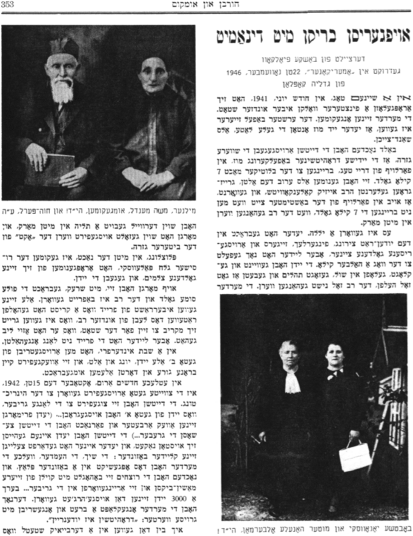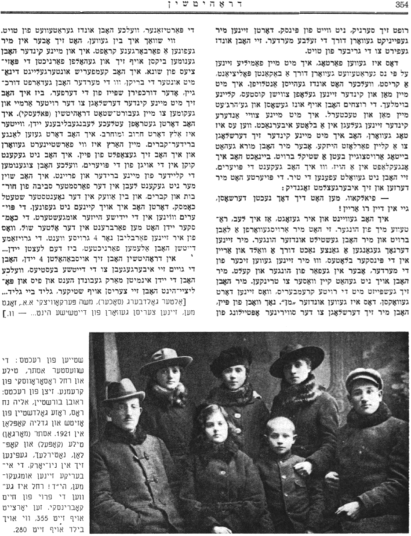
[Page 353]
[photo:] Batcha Yanovsky and her mother Hanele Alberman. May G-d avenge their blood!
[photo:] Moshe Mendel and Chava Perl Milner. Moshe perished. May G-d avenge their blood!

[Page 354]
murderers tormented us there, and took us to pits of death. It was in the early morning, and miraculously my family and I were saved by a policeman we knew. He was a Christian, and he told us to flee. My husband, children and I fled through the bushes and small trees. The murderers shot at us, and killed my husband and small daughter. My other two children and I spent the night in a swamp. The next day my children and I made our way to a small abandoned house, but I was afraid to go out in the daytime to beg for bread. At night I knocked at the door of some peasants I knew, but they did not want to open the door. The peasant woman recognized me, crossed herself and said, “Fialkov! You were shot yesterday. Go away!”
I started crying and told her that I was alive, begging her to save me from hunger. She threw out a loaf of bread, which calmed our hunger. We then spent the whole night in a forest and in the Pinsk swamps, where we were safe from the murderers, but endangered by cold and hunger. We also had no water to drink, but we survived on red cranberries that grew around there. It was our “manna” from heaven. After weeks of torment, we made our way to the Sviren unit of partisans, who saved us from death.
As weak as I was, I somehow found latent strength within myself, and my children and I got guns and helped destroy the enemy positions. I laid landmines under bridges on which the murderers were supposed to pass over, or brought food from the villages until my children and I got to the Red Army and returned home to Drohitchin. I found a few Jewish survivors there, and everything was utterly destroyed. I found large mass graves; my heart was cold as a stone, and I trembled with pain. I could not look into the faces of the peasants who had taken the clothes of my brothers and friends. I could no longer live in the poisoned atmosphere of ruins and graves, so I went to live in the nearby town of Khomsk, where I did not find anyone. The peasants were living in the Jewish houses undisturbed. The Jews of Khomsk had been burned in the old synagogue that was destroyed except for four large walls. The awful Germans exterminated everyone up to the last Jews in town.
There were four Jews hiding out in Drohitchin, and the gentiles had handed them over to the German savages who bound the Jews hand and foot before police dogs tore them to pieces, limb by ling.
(It is said that Alter Goldberg (of Socho), Moshe Perkovitsky and others were killed by the German dogs. W.)
[photo:] Standing, from right: Sisters Esther, Tila and Rachel Rosorovsky of Kremna. Seated from right: Reuven Burstein, Eliyahu Noach Ross, Rosa Goldstein, of Ozitch, and Gedaliah Kaplan in 1921. Esther (Morgan), Tila (Koppel) and Kaplan, of course, are now in New York. The others perished. May G-d avenge their blood! Rachel was the wife of Chaim Kobrinsky. See his memorial on p. 355, and a picture on p. 280.
Previous Page |
Next Page
JewishGen, Inc. makes no representations regarding the accuracy of
the translation. The reader may wish to refer to the original material
for verification.
JewishGen is not responsible for inaccuracies or omissions in the original work and cannot rewrite or edit the text to correct inaccuracies and/or omissions.
Our mission is to produce a translation of the original work and we cannot verify the accuracy of statements or alter facts cited.
 Drogichin, Belarus
Drogichin, Belarus
 Yizkor Book Project
Yizkor Book Project
 JewishGen Home Page
JewishGen Home Page
Copyright © 1999-2025 by JewishGen, Inc.
Updated 4 Dec 2001 by LA